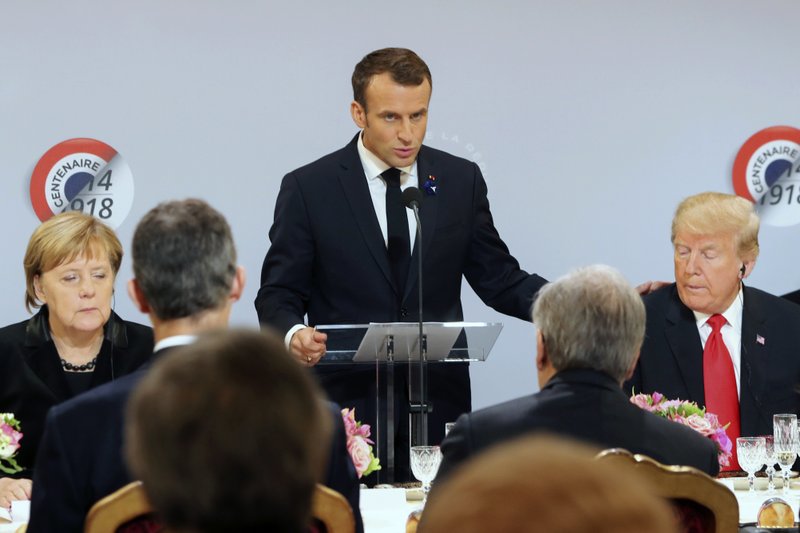WASHINGTON -- President Donald Trump escalated his verbal attacks against France on Tuesday, suggesting that America's stalwart European ally would have been vanquished in both world wars if not for the military firepower provided by the United States.
Trump tweeted about a suggestion by French President Emmanuel Macron that Europe build up its militaries because the continent can no longer depend on the U.S. for defense. Macron also had said Europe needs to protect itself against cyber-threats from China, Russia and the U.S.
Macron's comments were inaccurately reported and Trump misrepresented them in his tweets. The French leader's office said Trump had lumped together Macron's remarks on protecting against cyber-threats and "interference in our democracies" from "China, Russia and even the United States" with Macron's later statement on military defense.
"Macron suggests building its own army to protect Europe against the U.S., China and Russia," Trump tweeted. "But it was Germany in World Wars One & Two - How did that work out for France? They were starting to learn German in Paris before the U.S. came along. Pay for NATO or not!"
The president has long complained that NATO countries don't pay their fair share of the defense alliance's expenses, leaving the U.S. to carry much of the burden. He criticized Macron before and after attending a weekend ceremony in Paris to commemorate 100 years since the end of World War I.
Trump and Macron discussed defense, trade and other issues when they met Saturday at the Elysee Palace.
A top adviser to Macron said Tuesday that the French position has been "clarified." The official, who spoke on condition of anonymity in keeping with French customs, said Macron explained the European army issue to Trump, stressing that France was not making a choice between a European defense mechanism and multilateral organizations such as NATO.
Gerard Araud, France's ambassador to the U.S., challenged Trump's assertions. "For the sake of truth, Pres.EmmanuelMacron didn't say that EU needed an army 'against the US'. It was an erroneous press report," Araud tweeted.
Trump also complained Tuesday about tariffs on U.S. wines sold in France, saying it's "not fair, must change!" He also appeared to take a dig at Macron's low public approval rating.
"On Trade, France makes excellent wine, but so does the U.S. The problem is that France makes it very hard for the U.S. to sell its wines into France, and charges big Tariffs, whereas the U.S. makes it easy for French wines, and charges very small Tariffs. Not fair, must change!"
Nearly all U.S. wine exports to major markets, including the European Union -- of which France is a part -- face tariffs, according to the Wine Institute, which represents California winemakers in Washington on matters of tax, trade and regulatory issues.
"The problem is that Emmanuel suffers from a very low Approval Rating in France, 26%, and an unemployment rate of almost 10%. He was just trying to get onto another subject. By the way, there is no country more Nationalist than France, very proud people-and rightfully so! ... MAKE FRANCE GREAT AGAIN!"
Macron is hovering at around 30 percent in popularity polls, while the unemployment rate is just above 9 percent.
Trump appeared to be referring to Macron's comment Sunday during a speech for the World War I centennial in which he decried the rise of nationalism across Europe and elsewhere, calling it a "betrayal of patriotism." The comments were widely viewed as a rebuke of Trump, who sat stone-faced with other world leaders as Macron spoke and who embraces the "nationalist" label despite the negative connotations associated with the term.
Separately, German Chancellor Angela Merkel addressed EU lawmakers Tuesday after spending the weekend in Paris commemorating the end of World War I.
In the French capital she defended her worldview against the U.S. president's barbs as he sparred with Macron. In the EU parliament on Tuesday, she went a step further, telling deputies they need to adapt to a world in which Europe's traditional allies may no longer guarantee the continent's security.
"We should also work on the vision of one day creating a genuine European army," Merkel said. "The times in which we could unconditionally rely on others are over."
Merkel said an EU army would be "a positive extension" of the U.S.-led NATO alliance. In another jab at Trump, she expressed concern in an evening speech in Berlin about "very vehement attacks on multilateralism." The global order that arose after World War II is worth defending, she said.
Merkel has been urging her European colleagues to build or expand independent structures since last year, when Trump castigated NATO leaders in Brussels and withdrew from the Paris climate accord.
Information for this article was contributed by Darlene Superville and Sylvie Corbet of The Associated Press; and by Patrick Donahue and Jonathan Stearns of Bloomberg News.
A Section on 11/14/2018
